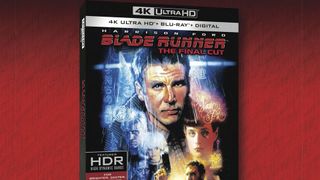Why some classic movies won't get a 4K makeover (and why HDR took the industry by surprise)
Not everything scrubs up well...

The 4K revolution is upon us. Whether you're slowly building a new library of UHD discs, or getting your fix from a streaming service, we're pushing more pixels to our peepers than ever before. But what the companies behind this televisual revolution didn't anticipate was the impact of one of the very features they were helping to promote: HDR.
"I think we didn’t recognise the possibilities and benefits of HDR until a little bit later," said Victor Matsuda, chair of the Blu-ray Disc Association's (BDA) Global Promotions Committee, speaking with TechRadar earlier this month.
"It’s much easier to recognise the benefits of resolution increase than anything else I think at the beginning especially.
"I think originally, among manufacturers, the buzzword was 4K. It’s very easy for consumers to remember 4K compared to any other acronym, and it was easier for everyone to relate to [than HDR] in the beginning."
And that, as a result, is going to be a massive part of the promotion of the format going forward, says Telly Kim, Executive Director of New Technology Marketing at Warner Bros. Home Entertainment.
"4K TVs came out, and have been available now for many years," he says.
"But it wasn’t until the last couple of years where HDR took prominence in terms of the consumer benefit. So the HDR education is playing catch up at this point. But you’ll see a lot of focus from the BDA promoting HDR as the primary benefit.
Get daily insight, inspiration and deals in your inbox
Get the hottest deals available in your inbox plus news, reviews, opinion, analysis and more from the TechRadar team.
The challenge of re-mastered movies
The 4K UHD disc market is growing at a healthy rate now. According to the BDA, the number of hi-res titles doubled since September last year, with close to 300 titles being available by the end of 2017. Disc sales are expected to have increased by 8-fold over 2016 when the numbers for 2017 have been crunched, too.
But for those looking to entirely upgrade their overflowing DVD or HD Blu-ray catalogues, there's a possibility that some UHD gaps may persist. While some titles, like the forthcoming Blade Runner: Final Cut release, are perfect for the format, others won't be so lucky. Put simply, some older titles – especially early CGI-heavy flicks – don't live up to the visual scrutiny of 4K fidelity.
"It’s challenging on the content side," admitted Kim.
"We heavily evaluate our catalogue titles to see which ones would benefit from 4K HDR, which titles may actually look worse with the 4K HDR treatment. From a content provider perspective we always want to make sure what we put out looks great – we’ve definitely identified titles that we’d like to put out on the format, gone back to the original source masters, done some tests and realised it wouldn’t benefit from a 4K HDR remaster."
As such, the growth of the format will still be mostly down to today's big studio releases, those that take advantage of modern technical upgrades.
We've [...] gone back to the original source masters, done some tests and realised it wouldn’t benefit from a 4K HDR remaster.
Telly Kim, Warner Bros.
"It’s still primarily driven by new releases," explained Kim.
"The studios have been pulling out re-releases of certain catalogue titles, and the catalogue re-releases and remasters are still growing. We haven't yet seen the push for catalogue purchases versus newer releases.
On the Warner bros side we have Blade Runner: The Final Cut coming out which will be huge. We've already release four of our Harry Potter franchise titles and the first four are coming out later this fourth quarter.
"Long live packaged media"
Regardless of what's eventually remastered for the format, Matsuda, believes that physical media is still the most important and reliable way to feast your eyes on 4K UHD HDR content.
"Streaming options are still facing a lot of difficulties when you look at the infrastructure required to enjoy the 4K UHD with HDR experience," says Matsuda.
"In key countries and cities in the United States the infrastructure to enjoy that is really limited. The average US bandwidth is 17Mbps, and Netflix recommends that at minimum you need 25Mbps for 4K.
"Around the world not many countries have that infrastructure – the US ranks only 10th as nation and that varies city to city, and many major cities in Europe certainly don’t approach the top 10 either. So long live packaged media!"
Gerald is Editor-in-Chief of iMore.com. Previously he was the Executive Editor for TechRadar, taking care of the site's home cinema, gaming, smart home, entertainment and audio output. He loves gaming, but don't expect him to play with you unless your console is hooked up to a 4K HDR screen and a 7.1 surround system. Before TechRadar, Gerald was Editor of Gizmodo UK. He is also the author of 'Get Technology: Upgrade Your Future', published by Aurum Press.
Most Popular


